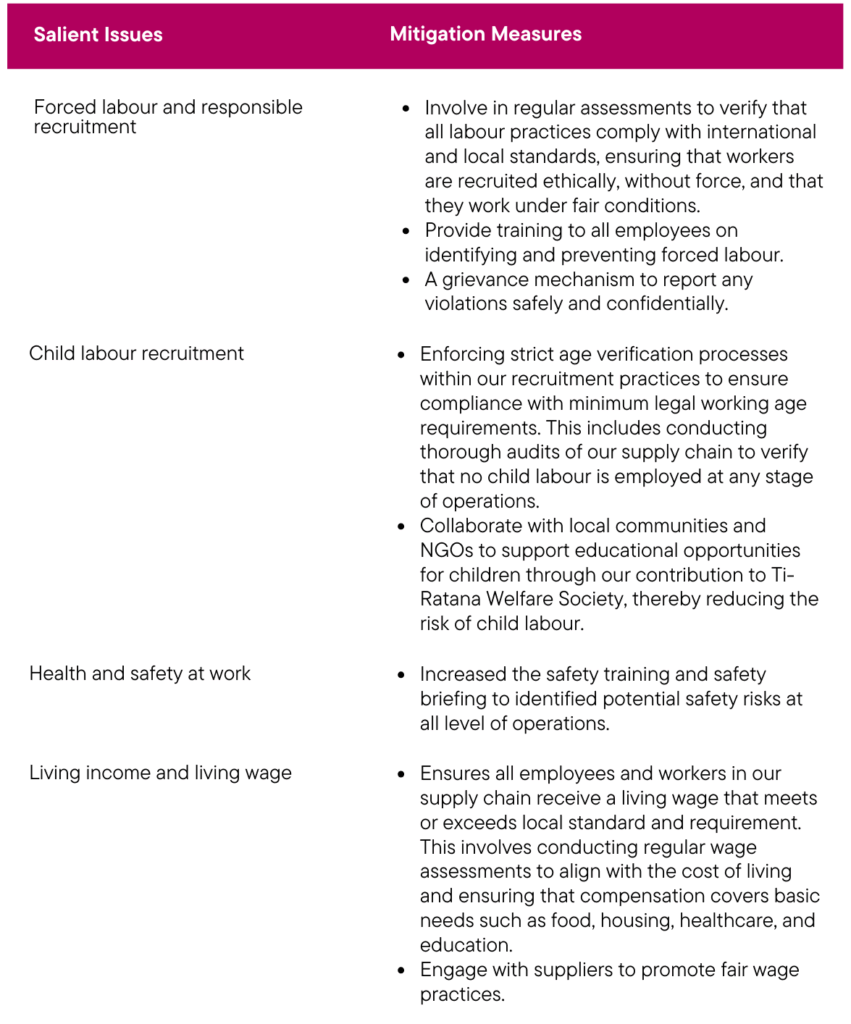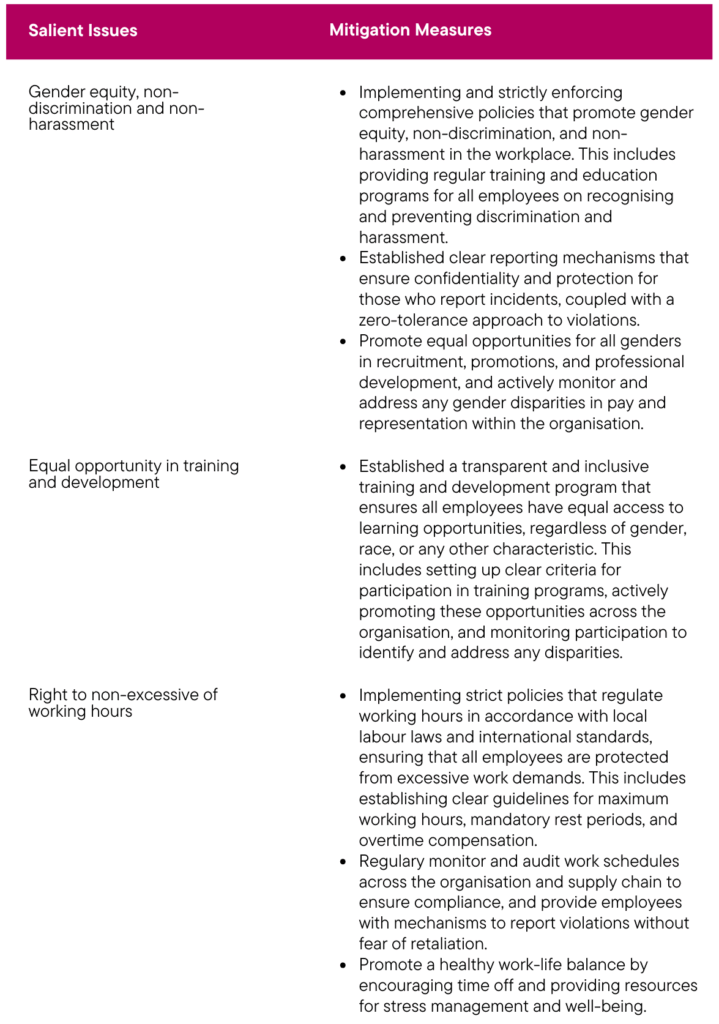SOCIAL
Employment Practices and Labour Standards
Masteel’s Labour Five Best Practices
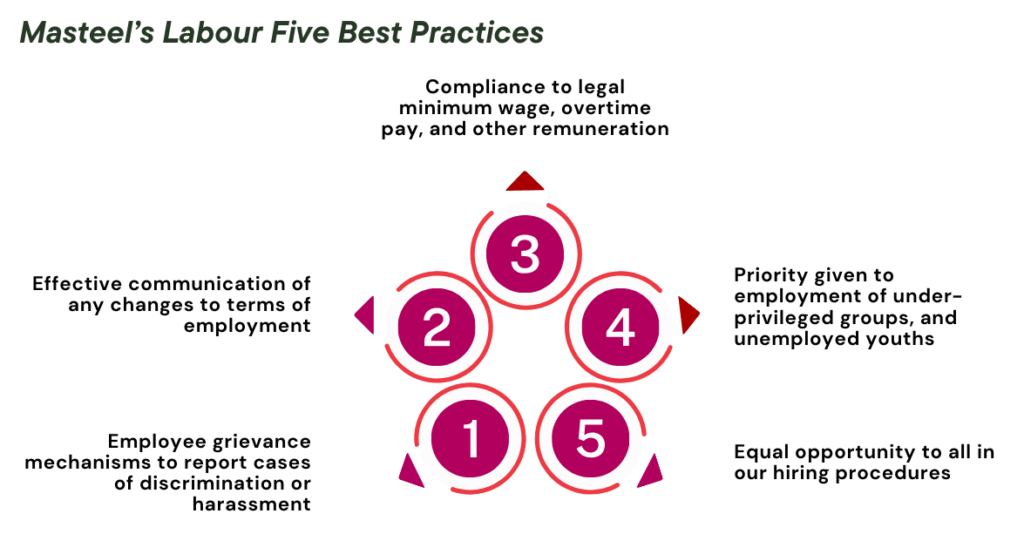
Masteel is dedicated to cultivating a thriving, equitable, and inclusive workplace, ensuring that every employee is treated fairly, respectfully, and in accordance with ethical labor standards. Our core principles guide the consistent implementation of our top five best workplace practices, reinforcing our commitment to employee well-being and diversity. We uphold strict compliance with the Prevention of Child Labour Policy, Prevention of Forced Labour Policy, and Human Rights Policy, which were formally introduced in 2021. These policies are thoroughly communicated to our internal and external stakeholders through email, town hall sessions and official Masteel website and made accessible in multiple languages, including English, Nepali, Thai, Bengali, Burmese, Filipino, and Chinese, ensuring that all stakeholders fully understand their rights. In FY2024, 131 new employees received comprehensive training on the Human Rights Policy while existing employees were informed through monthly meetings and brochure distribution.
We are committed to a fair and transparent hiring process, ensuring equal opportunities for all. Our recruitment practices strictly prohibit discrimination based on race, religion, gender, age, sexual orientation, disabilities, or nationality. We value diversity and merit, recognising that an inclusive workforce drives innovation and collaboration. In FY2024, Masteel recorded zero cases of discrimination, child labor, or forced labor, with no human rights-related grievances reported. This reaffirms our commitment to ethical employment and workplace integrity. Through proactive policy enforcement, continuous employee engagement, and a strong compliance framework, we remain dedicated to fostering a safe, inclusive, and respectful workplace.
Prevention of Child Labour Policy
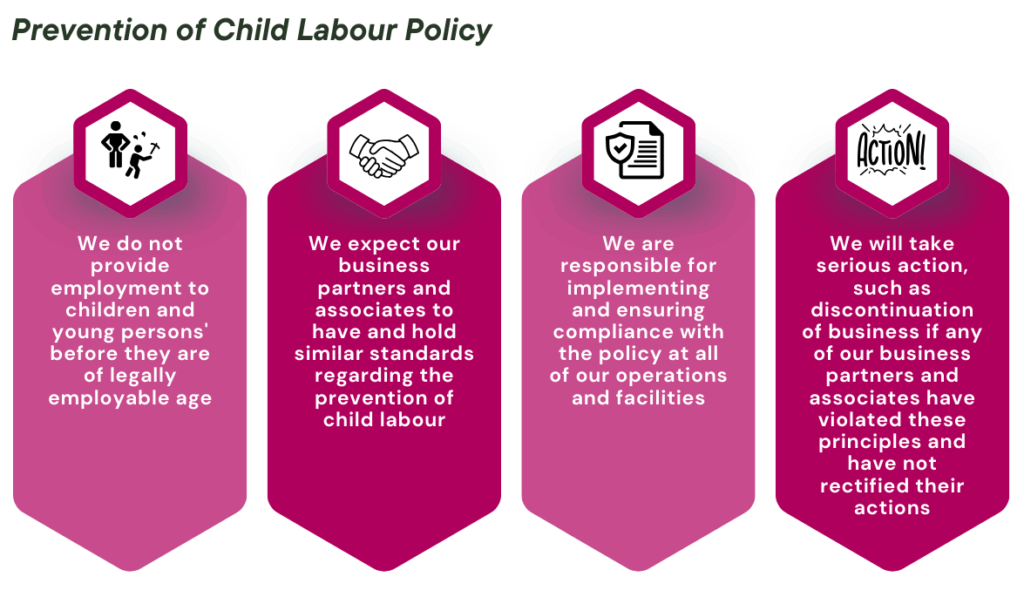
Masteel is firmly committed to upholding local labour laws and maintaining zero tolerance for child labour across all operations. This commitment is embedded within our employment policies and practices, ensuring strict compliance through rigorous hiring procedures. Our Prevention of Child Labour Policy clearly defines measures to prevent all forms of child labour, which are explicitly outlined in our Employee Handbook, alongside our employment terms and conditions. This policy also extends to our suppliers and contractors, ensuring that they align with our standards and expectations. All suppliers and contractors are required to adhere to the principles outlined in this policy, maintaining compliance with regulatory requirements, ethical business practices, and quality standards in their operations and engagements with our organisation.
To uphold this zero-employment policy for children and young persons, Masteel’s Human Resources department conducts thorough verification and inspections during the recruitment process to ensure full compliance. Additionally, any suspected violations can be reported through our whistleblowing platform as outlined in our Whistleblowing Policy, with direct escalation to the Chief Sustainability Officer, Group Human Resource Manager, or Head of Internal Audit for immediate action. Masteel remains committed to ensuring a responsible, ethical, and legally compliant work environment, reinforcing our dedication to human rights and fair labour practices.
Prevention of Forced Labour Policy
Similarly, Masteel maintains a zero-tolerance policy against forced or compulsory labour, reinforcing our commitment to protecting the rights and well-being of all employees and associated workers. As part of this commitment, our Prevention of Forced Labour Policy outlines four key guiding principles designed to effectively prevent and mitigate any instances of forced labour across our operations.
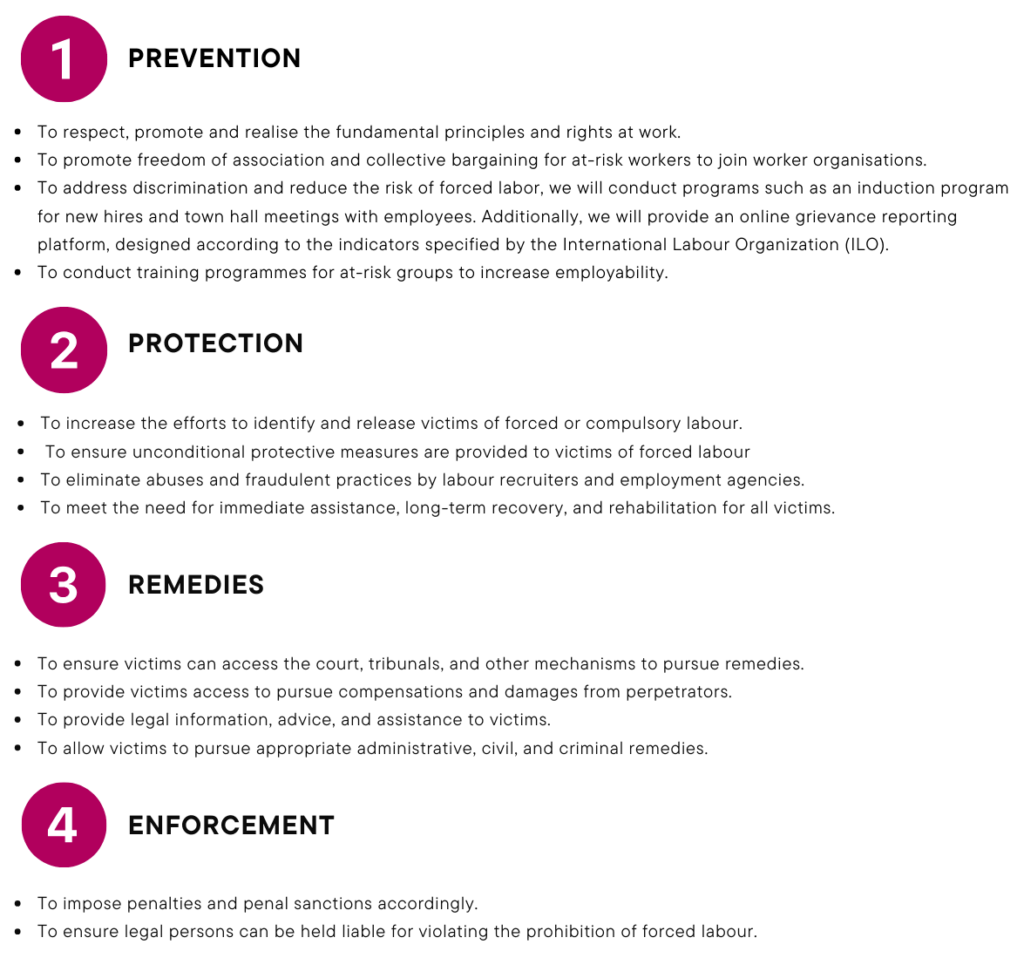
Respecting Human Rights
Masteel continue to remain steadfast committed to upholding human rights, ensuring compliance with globally recognised standards, including the International Bill of Human Rights and the UN Guiding Principles on Business and Human Rights. Our approach is further guided by the International Labour Organisation’s (“ILO”) Declaration on Fundamental Principles and Rights at Work, reinforcing our commitment to fair labor practices, workplace equity, and ethical operations.
To ensure effective oversight and accountability, Ms. Zueraini Ahmad Basri, Independent Non-Executive Director and member of the Board of Directors, is responsible for monitoring human rights compliance across the Group. This governance structure ensures that we effectively integrates human rights considerations into our business operations and decision-making processes, aligning with local and international guidelines on corporate responsibility and ethical business conduct.
Prevention of Forced Labour Policy
Masteel proactively identifies, assesses, and mitigates human rights risks within our operations, supply chain, and stakeholder engagements. Our risk assessment framework, aligned with the UN Guiding Principles on Business and Human Rights, evaluates both positive and negative social impacts of our business activities, particularly those related to labour rights, working conditions, and supply chain management.
These assessments also ensure compliance with Masteel’s Human Rights Policy, which prioritises:
a. Upholding local labour laws and fair employment practices
b. Ensuring safe and conducive working conditions
c. Protecting employee health, safety, and well-being
d. Promoting community welfare and responsible corporate citizenship
e. Implementing ethical supply chain management
Transparency, Reporting, and Grievance Mechanisms
Masteel has established formal reporting channels in accordance with our Human Rights Policy and Grievance Procedures, as detailed in our Employee Handbook. Employees, suppliers, and other stakeholders are encouraged to report any human rights-related concerns through our dedicated grievance mechanisms, ensuring confidentiality and non-retaliation.
Furthermore, Masteel prioritises transparency by openly communicating action plans to address human rights challenges and reporting on progress achieved. This approach ensures accountability, continuous improvement, and alignment with global best practices, reinforcing Masteel’s role as a responsible and ethical corporate leader.
We are committed to proactively identifying, assessing, and managing human rights risks across our entire value chain. As part of our Human Rights Policy, we have established robust protocols to mitigate potential human rights impacts and ensure responsible business practices at every operational level.
A key component of this commitment is the implementation of a secure and anonymous grievance mechanism, allowing employees, suppliers, and other stakeholders to report concerns confidentially and without fear of retaliation. All grievances submitted through this platform are handled with the highest level of sensitivity and in strict compliance with our ethical and regulatory standards.
Within the “Safeguard” section of Masteel’s Human Rights Policy, we reaffirm our accountability in addressing any human rights impacts linked to our business operations. In cases where Masteel is found to be directly or indirectly involved in human rights violations, we are fully committed to taking immediate corrective action, engaging with relevant stakeholders, and implementing remedial measures to prevent recurrence.
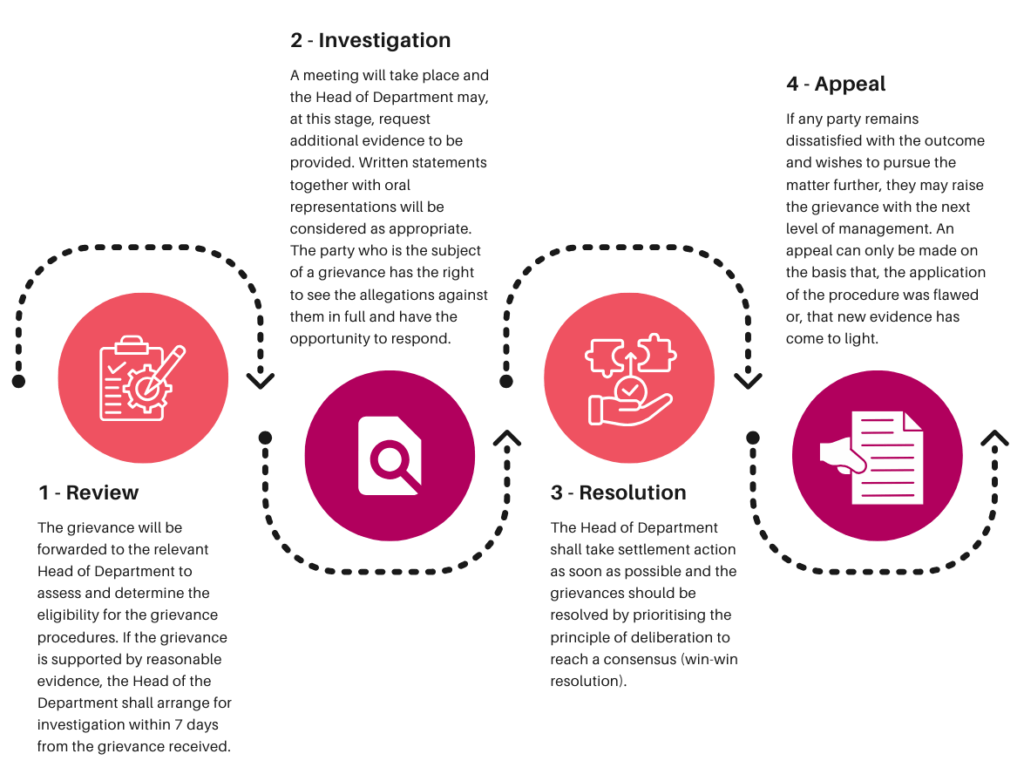
To ensure transparency and effective resolution of human rights-related concerns, our grievance management process follows a structured four-step framework, which is designed to provide timely, fair, and comprehensive resolution of all reported issues.
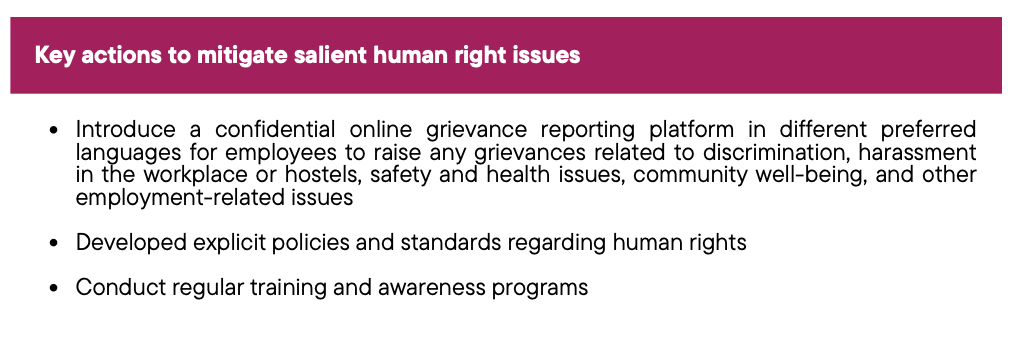
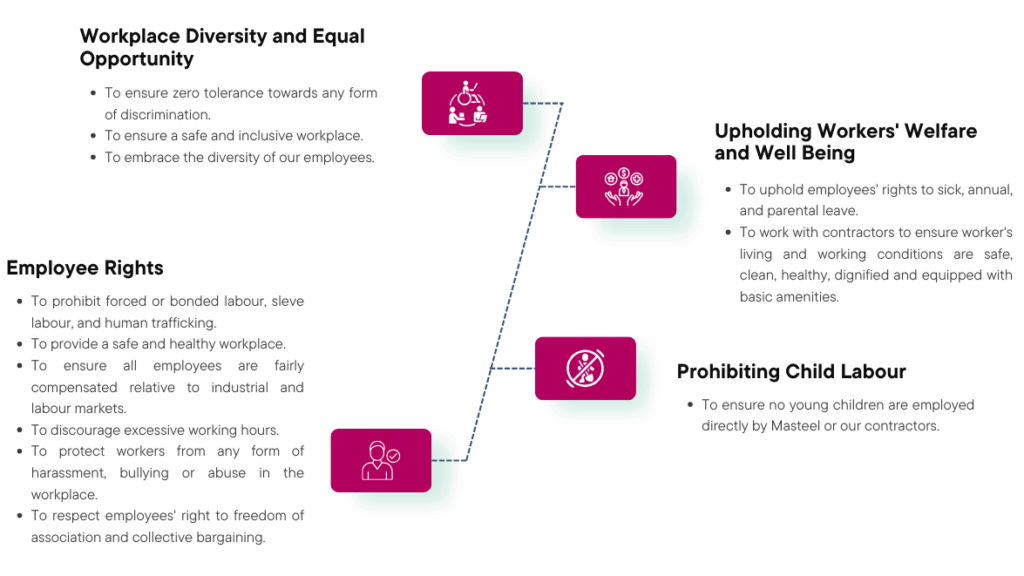
Masteel is dedicated to upholding the highest standards of human rights and labour practices, ensuring a safe, inclusive, and ethical work environment. Our commitment extends beyond compliance with local and international labour laws to actively fostering a workplace culture built on diversity, fairness, and respect. These principles are embedded in our policies and daily operations, reinforcing our dedication to corporate responsibility, employee well-being, and ethical supply chain management.
To strengthen this commitment, we have established four primary guiding principles that serve as the foundation of our human rights framework. These principles encompass Workplace Diversity and Equal Opportunity, Employee Rights and Fair Treatment, Upholding Workers’ Welfare and Well-being, and Prohibiting Child Labour. Each principle is supported by clear policies and initiatives aimed at ensuring ethical employment practices, protecting workers’ rights, and fostering a responsible business ecosystem. The above figure provides a comprehensive overview of Masteel’s human rights commitments, outlining the key measures we have implemented to safeguard the dignity and rights of all employees, contractors, and stakeholders.
Gender Balance
In recent years, Masteel has made significant progress in fostering gender balance within its top management. A key milestone in this journey has been the increased representation of women on our Board of Directors. As of FY2023, women comprise 37.5% of the Board, with three female executive directors actively contributing to strategic decision-making. This achievement underscores our ongoing commitment to promoting gender diversity at the highest levels of leadership, aligning with global best practices and corporate governance standards.
While the steel manufacturing industry remains traditionally male-dominated, we recognises the importance of fostering an inclusive and equitable workplace. Since 2021, we have actively championed equal pay for equal work, ensuring that all employees are compensated fairly regardless of gender. We conduct annual equal pay reviews to uphold pay equity, evaluating compensation structures to eliminate any disparities and reinforcing our dedication to fair remuneration practices.
Moreover, Masteel’s recruitment and talent development strategies are firmly rooted in a merit-based approach, where hiring decisions are based solely on qualifications, performance, skills, and experience. By fostering a culture of fairness and inclusivity, we strive to create an environment where all employees regardless of gender where we can thrive, advance, and contribute meaningfully to the company’s growth.
We continues to drive positive change, demonstrating that gender diversity and inclusion are integral to building a sustainable and high-performing organisation through all these ongoing efforts and initiatives.
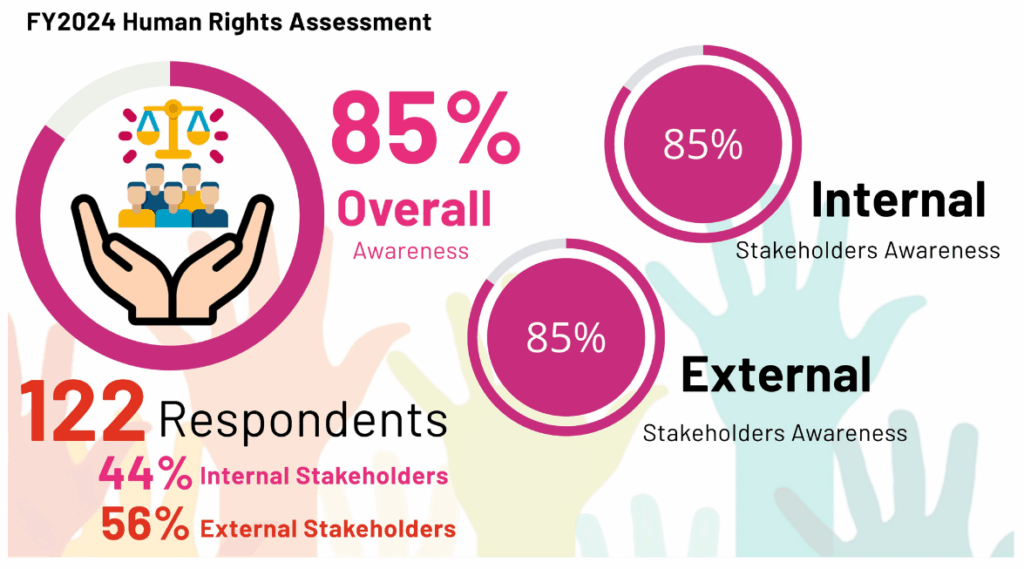
Masteel’s continuously engaging with our internal and external stakeholders to enable us to identify and address your eight key salient labour issues within our business operations and value chain, as outlined in our Human Rights Policy. As part of our rigorous due diligence process, we conducted a comprehensive Human Rights Risk Assessment to assess both actual and potential labour related risks. This assessment involved 122 respondents, including 54 internal stakeholders and 68 external parties, providing a holistic understanding of labour challenges across our operations. The insights gained from this process serve as a foundation for targeted interventions and continuous improvements, reinforcing Masteel’s commitment to ethical labour practices and responsible business conduct.
Eight (8) potential salient labour issues:
- Forced labour and responsible recruitment;
- Child labour recruitment;
- Health and safety at work;
- Living income and living wage;
- Gender equity, non-discrimination and non-harassment;
- Equal opportunity in training and development;
- Right to non-excessive of working hours; and
- Right to employees’ welfare and well-being.
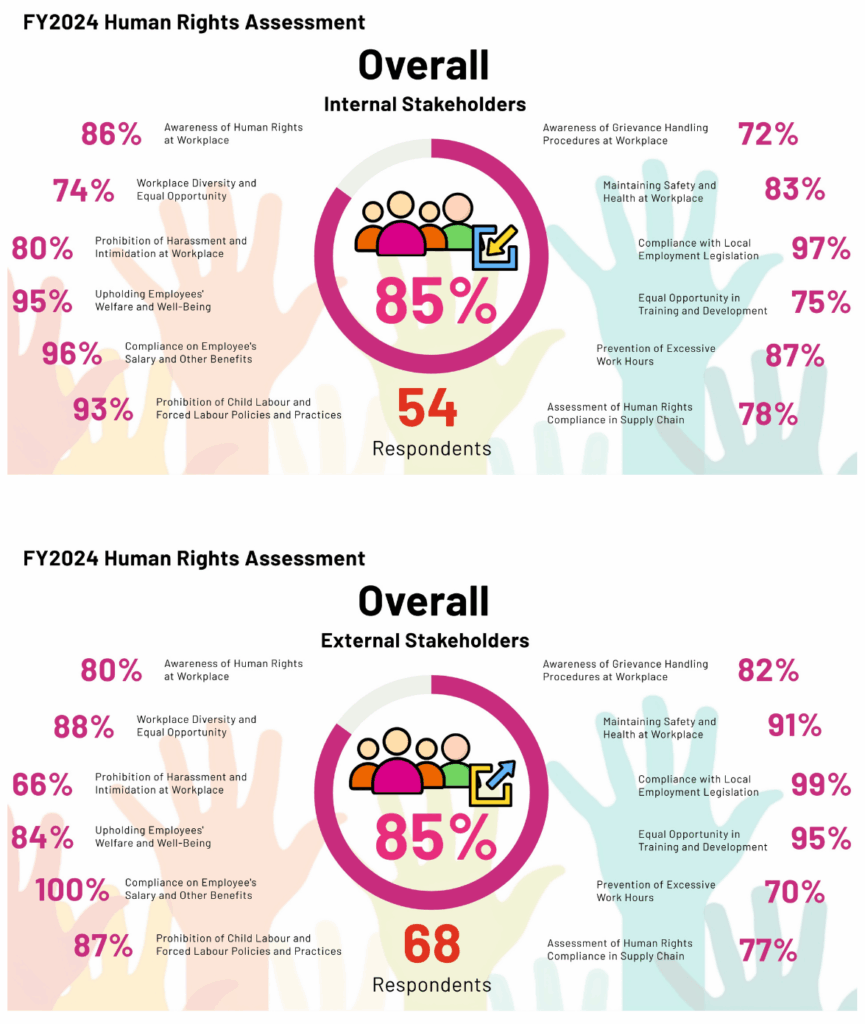
In FY2024, the assessment results provided valuable insights, revealing that 85% of respondents have a clear understanding and awareness of Masteel’s Human Rights Policy. This strong level of awareness reflects the effectiveness of our ongoing stakeholder engagement initiatives, reinforcing the impact of our efforts to communicate and uphold human rights standards within our operations.
These findings validate the success of our current engagement strategies and serve as a foundation for continuous improvement. Encouraged by the positive response, we remain committed to enhancing our approach, ensuring that all stakeholders maintain a deep understanding and commitment to respecting and upholding human rights principles at Masteel.
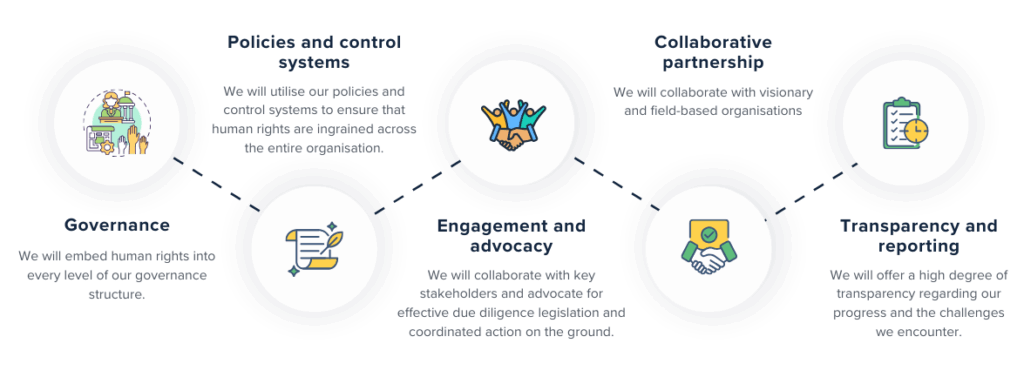
To enhance our ability to evaluate, manage, and transparently report on human rights risks, we have developed targeted action plans for each salient labor issue identified. These plans establish a structured approach to assessing, mitigating, and communicating our efforts, ensuring that the necessary steps are taken across our value chain while identifying opportunities for collaborative action. Our strategies are further reinforced by five key enablers, which serve as the foundation for implementing effective and sustainable human rights practices within Masteel’s operations.
